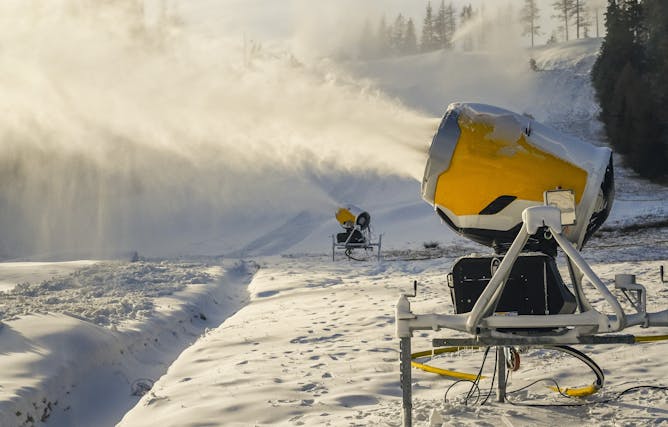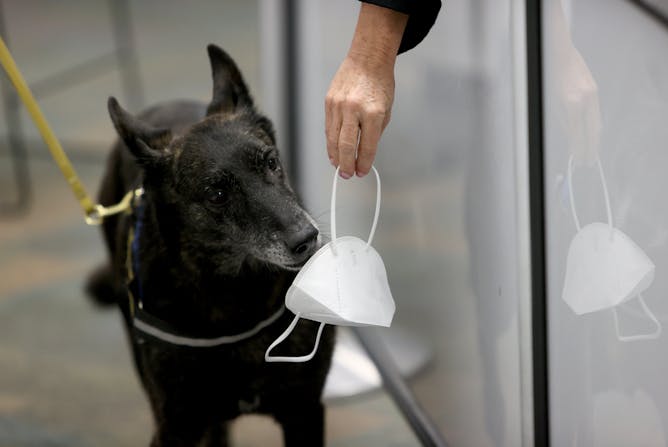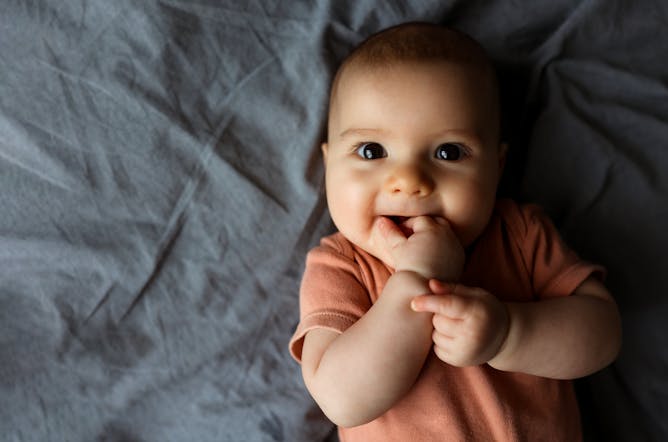|
The Olympics are in full swing and we at The Conversation have brought our distinctive approach to covering them from many perspectives – from the politics of the games to the science of sports. In our latest dispatch, an atmospheric scientist and avid skier delves into the science of snowmaking, without which these games would not be possible. And two researchers of sports physics explain the many forces of physics at play for ski
jumpers and for competitors of the somewhat terrifying sports of luge, bobsled and skeleton.
One of the great things about working at The Conversation is learning from academics in so many disciplines. Today I learned that it’s forensic scientists who study whether dogs can sniff out and detect COVID-19. Researchers from Florida International University report on how they do their work and the success of their dogs: “We believe that dogs hold great promise as a rapid screening method that, used with other measures such as rapid tests, can help stop COVID-19 spread and end the pandemic.”
Last year we published a series of articles on gender diversity and children, which opened my eyes to the many issues transgender kids and their families face. This follow-on piece delves into the growing controversy around the practice of assigning sex to people at birth. “For those who don’t fit neatly into one of two categories – and there are millions – an inappropriate classification on a birth certificate can have
consequences that last a lifetime,” researchers Carl Streed Jr from Boston University and Harvard’s Frances Grimstad write.
Also in this week’s science and research news:
If there’s a subject you’d like our team of science editors to investigate, please reply to this email.
|

Snowmaking machines blow cold water, which freezes before it hits the ground.
Alexander Uhrin/iStock via Getty Images
Peter Veals, University of Utah
Snowmaking machines can produce enough snow to cover a run, but artificial snow is very different from natural flakes that fall from the sky.
|

Researchers at Florida International University successfully trained One Betta, a Dutch Shepard, and three other dogs to detect COVID-19 on face masks. The dogs got it right 96% to 99% of the time.
Joe Raedle/Staff/Getty Images North America
Kenneth G. Furton, Florida International University; Julian Mendel, Florida International University; Kelvin J. Frank Jr., Florida International University
Dogs have such sensitive noses that they can be trained to detect the odors of crop pests, endangered species, illegal drugs – and diseases like COVID-19.
|

Although the medical establishment is now recognizing that sex is not binary, society as a whole has been slow to embrace the concept.
Vera Livchak/Moment via Getty Images
Carl Streed Jr, Boston University; Frances Grimstad, Harvard University
Millions of people do not fit neatly into male or female sex designations at birth, and wrong identification can set them up for a lifetime of physical and mental harm.
|
|
|
-
Mathieu Morlighem, Dartmouth College
Glaciers in North America, Europe and the Andes, in particular, have significantly less ice than people realized.
-
Ronald C. Desrosiers, University of Miami
Some cancers are actually caused by viruses that linger for long periods in the body, or cause physical damage that later turns cancerous.
-
Jonathan S. Comer, Florida International University; Anthony Steven Dick, Florida International University
Children don’t have to be in physical danger for disaster images to have a powerful psychological impact.
-
John Eric Goff, University of Lynchburg
It may look like athletes in bobsled, luge and skeleton simply grab a sled and hang on until the bottom, but high-speed physics and tiny motions mean the difference between gold and a crash.
-
Nancy Fresco, University of Alaska Fairbanks
Homegrown tomatoes and corn in Alaska? Climate change could make it possible in the 2030s and ‘40s – a rare silver lining for this fast-warming state.
-
Krishna Rao, Stanford University; Alexandra Konings, Stanford University; Marta Yebra, Australian National University; Noah Diffenbaugh, Stanford University; Park Williams, University of California, Los Angeles
A new study maps vegetation’s fire risk across the West and shows where population in the highest-risk areas from California to Texas is booming.
-
Kevin Doxzen, Arizona State University
Record-breaking technology can sequence an entire human genome in a matter of hours. The work could be a lifeline for people suffering from the more than 5,000 known rare genetic diseases.
|
|